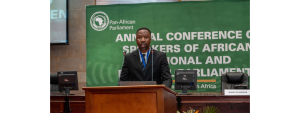
- Rafael Hangula
Midrand, South Africa – The Chairperson of the National Council, Hon Lukas Sinimbo Muha, has called on African parliaments to assume a more active and institutionalised role in promoting peace, unity, and stability across the continent.
He made the remarks on Tuesday during the Annual Conference of Speakers of African Parliaments, held in Midrand, South Africa, from 29 to 30 September 2025.
Speaking under the conference theme “Parliamentary Diplomacy, Negotiation and Mediation for Peace and Stability”, Hon Muha said Africa’s legislative institutions must be recognised not only as lawmaking bodies, but also as vital actors in peacebuilding, conflict resolution, and diplomatic engagement.
He emphasised that the sub-theme ocusing on the role of parliaments in mediation, negotiation, and peacebuilding is not a peripheral issue but a fundamental necessity for Africa’s long-term development and integration.
“Too often, our continent’s development trajectory has been disrupted by conflict, instability and fragmentation. Yet within our parliaments lies a quiet but powerful force the diplomacy rooted in dialogue, legitimacy, and the will of the people,” he told the assembly of Speakers, Members of Parliament and delegates.
Hon Muha underscored the value of parliamentary diplomacy as a complement to traditional statecraft.
He described it as a bridge between national interests and regional aspirations, enabling parliaments to foster cross-border trust, mutual understanding, and platforms for preventive diplomacy.
He called on African legislatures to actively participate in shaping peace processes, monitoring the implementation of agreements, and ensuring that citizens’ voices particularly those of women, youth and civil society are included in peacebuilding efforts.
The head of Namibia’s Upper House also urged for the institutionalisation of parliamentary diplomacy across the continent, noting that peace agreements must not be confined to executive negotiation alone, but should be scrutinised, debated, and legitimised within national legislative bodies.
He further encouraged the strengthening of the Pan-African Parliament (PAP) and regional parliamentary forums to serve as early-warning systems and coordinated response platforms to address emerging and ongoing conflicts.
Referring to the African Union’s Agenda 2063, Muha reiterated that the vision of a peaceful and secure Africa can only be realised if parliaments are fully integrated into the continent’s peace and security architecture.
“Peace is not merely the absence of war,” he said. “It is the presence of justice, equity, and democratic participation.”
Looking beyond the continent, Hon Muha called for a reimagined role for African parliaments on the global stage. He stressed that Africa must engage international partners from a position of confidence, advocating for fair trade, climate justice, and reforms in global governance that reflect Africa’s growing demographic and moral influence.
“Africa must speak not only with one voice, but with a voice that is informed by the lived realities of its people,” he added.
He urged his counterparts to embrace this role and transform their legislative chambers into platforms of peace and cooperation.
“Let our parliaments be sanctuaries of peace, corridors of cooperation, and beacons of hope for generations to come. Together, we can build the Africa we want,” he concluded.
In his opening address at the conference, President of the Pan-African Parliament, H.E. Chief Fortune Charumbira, also called on parliamentary leaders to rise as pillars of hope, and agents of peace.
President Charumbira urged stronger inter-parliamentary diplomacy and challenged legislatures to take a more active role in conflict resolution, questioning why parliaments continue to stand aside “while our people perish.”
The 2025 Conference served as a high-level platform for parliamentary political leadership to deliberate on strategic issues of continental and global significance.
It underscored the dual responsibility of parliaments to safeguard democracy and citizens’ rights, while advancing Africa’s transformation agenda and strengthening collective contributions toward Agenda 2063 and the United Nations Sustainable Development Goals (SDGs).






